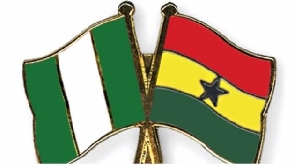The impasse between the Ghana Union Traders Association (GUTA) and foreign retail traders, particularly Nigerians, does not appear to be coming to an end soon.
Only two weeks ago, the Nigerian community in Ghana took the matter to another level by petitioning the Nigerian government to come to their aid over what they described as “unfair treatment in Ghana”.
Their petition followed the closure of shops belonging to foreign retailers in some parts of the country, for violating the laws of Ghana that bar foreign nationals from operating retail shops.
The exercise that was carried out by a committee set up by the Ministry of Trade and Industry said it was enforcing the country’s law that forbade foreigners from the retail trade.
Displeased by the action of the committee, the Nigerian community petitioned their High Commissioner that their financial burden had been worsened following the closure of their shops in the midst of the COVID-19 pandemic.
The General Secretary of the All Nigerian Community, Mr Isaac Osahon Ekhator, said some members of the association were contemplating leaving behind their goods and move back to Nigeria because of the difficulties they were facing following the closure of their shops.
He expressed surprise that their government did not seem concerned about their plight in Ghana and pointed out that if it were to be in another country, their government would come to their aid.
“On behalf of citizens of Nigeria in Ghana, we appeal to the Federal Republic of Nigeria to urgently consider this burning issue and promptly intervene to bring hope and lessen the plight of her citizens,” Mr Ekhator stated.
The Ghanaian Times finds this unending impasse very unfortunate because this is a problem that could be resolved easily between the two parties.
We are concerned that the impasse has existed for a long time and the governments of Ghana and Nigeria have not been able to resolve it to enable the Ghanaian traders to live in harmony with their counterparts from Nigeria.
What is baffling is that countries in Africa are eagerly preparing to roll out a Continental Free Trade Area ageeement and African citizens and countries are expected to trade among themselves freely.
Why is it then difficult for citizens of the various countries to trade in each other’s country?
It is without doubt that individual countries have fashioned out laws, rules and regulations for the operation of retail trade in their countries and each country must uphold its laws and regulations but that cannot be done in arbitrary manner against citizens of other countries.
It is for this reason that we urge the Ministry of Trade and the stakeholders to sit at the table, discuss thoroughly and openly the concerns of all in order to arrive at amicable settlement.
The continuous bickering between the stakeholders rather paints a gloomy picture of the situation and does not give any hope that the impasse would be resolved soon.
It is our hope that the Ministry of Trade would lead all the stakeholders to understand what exactly the obligations of each one of them are in order to bring peace in the Ghanaian retail sector.
It is shameful for citizens of both countries to be at each other’s throat when we are expected to be working together in West Africa in the interest of all citizens in the sub-region.
Editorial News of Monday, 31 August 2020
Source: ghanaiantimes.com.gh
Ghanaian Times: Impasse between GUTA and foreign retailers must not escalate
Entertainment
















